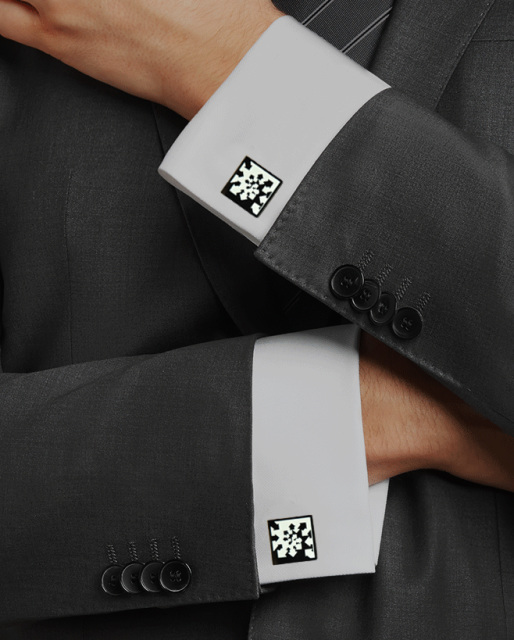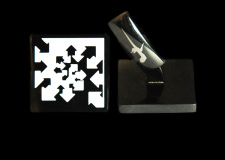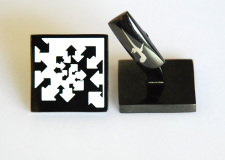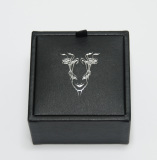- Cufflinks
- >
- Cufflink Nautilus Black&White
Cufflink Nautilus Black&White
SKU:
CL-NA-BW
SGD 115.00
SGD 115.00
Unavailable
per item
Bespoke Cufflinks
Based on Interaction Series of paintings
Material: Metal Alloy with Gunmetal Finish and Enamel with bespoke Box
Color/ Designs: Based on Interaction Series of Paintings
Size : 20X20mm
Inspiration Based on Interaction series of Paintings
The Nautilus:
Is based on the concept of the Yin –Yang, The Yin and Yang of Geometry. It is divided by a single continuous line starting and ending at the same point, dividing the canvas in two equal sections representing male and female, creating an illusion of a complex set of patterns, a mandala.
“The interdependence” of a crest and a trough forming a wave is reflected in the two sides of the painting, with one side raised and the other receding. A wave is created only if there is a crest and a corresponding trough, the creation of one being dependent on the other. As a representation of racial harmony and interaction I decided to conceptualise my creation around the mandala, the interaction of light and dark or white and black to create an infinite range of greys a pivot of possibilities.
Lakshmi’s main inspirations for this group of paintings was the ancient symbol of the mandala: which represents the whole cosmos as well as our own place inside it. The word comes from Sanskrit and means encircled essence. The psychoanalyst Carl Jung called the mandala ‘a representation of the unconscious self’. It represents wholeness, order and unity. It is there to tell us we are part of a cosmic universe, a way to apply balance and harmony to our world bridging the visible and invisible, physical and spiritual. What first strikes the viewer when seeing Lakshmi Mohanbabu’s latest work for the first time is the ultra modern look - clean lines, bright colours and powerful geometric shapes that appear three dimensional. Each painting is done in a single vivid colour and when viewing them as a whole it is like being at the centre of a huge colour wheel. Lakshmi has divided her work into sets: The first set are based on the primary colours red, yellow and blue using a triangular theme: the eye of the viewer is pulled to the top and bottom corners by the coloured arrows and then back to the centre by the dark depressed arrows. Her second set of paintings are based on the form of a lotus blossom radiating outwards and inwards, and the colours are produced by mixing the primary colours together to make a green, orange and purple. Her third set consist of six interactions are based on the gammodian cross and the dromenon. The gammodian cross is an ancient symbol found in eastern cultures denoting good luck and well being. It is a cross bent at ninety degrees giving the impression of a spiral moving both inwards and outwards. The dromenon, represents the journey from the outer physical world to the inner sacred world and the relationship between them. This time Lakshmi has produced the colours by mixing the secondary colours with the primary colours. So there is a progression through the interactions both in colour, complexity and theme.
Lakshmi has used her training as an architect and in particular her study of global architectural forms and buildings to give the impression of three dimensions. Interdependent raised and depressed arrows going in opposite directions is the overarching visual theme of her work.
This is a multilayered expression, which, at first, impresses with its brightly coloured geometric images and yet as the viewer goes deeper he or she is drawn into the world of ancient cross cultural symbols going back thousands of years, emphasising our interconnectedness, universal spiritual heritage and common desire to impose order onto a chaotic world.
The Nautilus:
Is based on the concept of the Yin –Yang, The Yin and Yang of Geometry. It is divided by a single continuous line starting and ending at the same point, dividing the canvas in two equal sections representing male and female, creating an illusion of a complex set of patterns, a mandala.
“The interdependence” of a crest and a trough forming a wave is reflected in the two sides of the painting, with one side raised and the other receding. A wave is created only if there is a crest and a corresponding trough, the creation of one being dependent on the other. As a representation of racial harmony and interaction I decided to conceptualise my creation around the mandala, the interaction of light and dark or white and black to create an infinite range of greys a pivot of possibilities.
Lakshmi’s main inspirations for this group of paintings was the ancient symbol of the mandala: which represents the whole cosmos as well as our own place inside it. The word comes from Sanskrit and means encircled essence. The psychoanalyst Carl Jung called the mandala ‘a representation of the unconscious self’. It represents wholeness, order and unity. It is there to tell us we are part of a cosmic universe, a way to apply balance and harmony to our world bridging the visible and invisible, physical and spiritual. What first strikes the viewer when seeing Lakshmi Mohanbabu’s latest work for the first time is the ultra modern look - clean lines, bright colours and powerful geometric shapes that appear three dimensional. Each painting is done in a single vivid colour and when viewing them as a whole it is like being at the centre of a huge colour wheel. Lakshmi has divided her work into sets: The first set are based on the primary colours red, yellow and blue using a triangular theme: the eye of the viewer is pulled to the top and bottom corners by the coloured arrows and then back to the centre by the dark depressed arrows. Her second set of paintings are based on the form of a lotus blossom radiating outwards and inwards, and the colours are produced by mixing the primary colours together to make a green, orange and purple. Her third set consist of six interactions are based on the gammodian cross and the dromenon. The gammodian cross is an ancient symbol found in eastern cultures denoting good luck and well being. It is a cross bent at ninety degrees giving the impression of a spiral moving both inwards and outwards. The dromenon, represents the journey from the outer physical world to the inner sacred world and the relationship between them. This time Lakshmi has produced the colours by mixing the secondary colours with the primary colours. So there is a progression through the interactions both in colour, complexity and theme.
Lakshmi has used her training as an architect and in particular her study of global architectural forms and buildings to give the impression of three dimensions. Interdependent raised and depressed arrows going in opposite directions is the overarching visual theme of her work.
This is a multilayered expression, which, at first, impresses with its brightly coloured geometric images and yet as the viewer goes deeper he or she is drawn into the world of ancient cross cultural symbols going back thousands of years, emphasising our interconnectedness, universal spiritual heritage and common desire to impose order onto a chaotic world.







